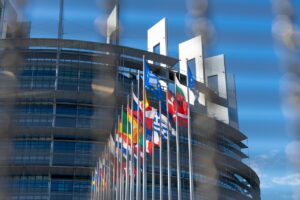Our Common Interest: Global Gateway Needs a Democracy Boost
The mission letter of Commissioner-designate Jozef Síkela (International Partnerships) emphasizes infrastructure investment, trade, and macro-economic support, including through Global Gateway. This flagship initiative aims to compete with China’s Belt and Road Initiative. Ahead of the Commissioner-designate hearings this week, however, it is important to note that to succeed, Global Gateway must explicitly include governance and democracy in its projects. By doing this well, the EU can promote development, bolster security, and deepen economic ties without sacrificing its values and democratic ambitions.
Kenya’s Standard Gauge Railway runs 609 kilometers from Nairobi to Mombasa. In a country racing to become part of the global market, the railway is both a beacon of progress and a source of increasing tension.
At the heart of the problem is Kenya’s relationship with China. China financed 90% of the railway and Chinese companies built it. Problems quickly emerged, starting with the decision to ignore World Bank recommendations, leading to cost overruns of 1,500% and a USD 200 million annual operating loss. This contributed to Kenya’s escalating debtOpenly disclosing information about government debt enables informed decision-making, mitigates the risk of financial instability, and allows citizens to hold their governments accountable for respons... More crisis, delaying USD 400 million in interest payments and fueling unrest. To manage the debt, Kenya handed the railway’s operations to a Chinese company, redirecting profits away from Kenya.
These issues stem directly from a lack of democratic oversight. Loan agreements were kept secret and bidding wasn’t competitive. Despite strong transparencyAccording to OGP’s Articles of Governance, transparency occurs when “government-held information (including on activities and decisions) is open, comprehensive, timely, freely available to the pub... More laws, the government refused to publish project details, citing confidentiality. Whistleblowers who raised concerns first faced bribes, then threats.
In spite of this, Kenya returned to China for more loans in early 2024. Why do officials continue down this path? And can the EU offer a better alternative? We believe it can if Europe and its partners embrace democratic participation in and oversight of Global Gateway’s infrastructure projects.
The EU’s Global Gateway is meant to be a better-quality alternative to China’s Belt and Road Initiative. Launched in 2021, the EUR 300 billion initiative aims to be more sustainable, values-driven, and transparent.
Yet gaps remain. In her inaugural speech, EU President Ursula von der Leyen stressed the importance of the initiative but didn’t mention democracy. A new report by Oxfam, EuroDAD, and Counter Action found that many Global Gateway supported projects lack appropriate oversight.
However, proven solutions exist to spend money wisely, align values with actions, and build partnerships instead of dependencies.
Democratic oversight just makes practical sense. Clean audits help clean politicians get re-elected. Open contracting brings better value for the euro. Grievance mechanisms channel conflict into peaceful processes. Disclosing debt lowers borrowing costs and lets governments spend more on security or welfare. When we forego these proven methods, we reward the corrupt at the expense of the public.
On the project level, we know that requiring citizen monitoring mechanisms such as Integrity Pacts involve civil society to report on project development and implementation to reduce corruption. Better value for money is supported by competitive and transparent procurement, published in open dataBy opening up data and making it sharable and reusable, governments can enable informed debate, better decision making, and the development of innovative new services. Technical specifications: Polici.... Adopting transparency standards for example from CoST help to provide public information on project costs and progress. Open and independent auditsInstitutional and legal frameworks are necessary for providing assurance of the integrity of financial information and of compliance with budgetary rules and procedure. Technical specifications: These... with public reports help to build trust and accountability while meaningful grievance mechanisms ensure stakeholders can voice concerns and resolve disputes.
The EU should also support public administration reform, democratic governance, and rule of law in recipient countries. This can be done through support to democratic institutions, providing technical aidMore and better information about aid helps partner countries and donor institutions plan and manage aid resources more effectively, parliaments and civil society to hold governments accountable for t... for electionsImproving transparency in elections and maintaining the independence of electoral commissions is vital for promoting trust in the electoral system, preventing electoral fraud, and upholding the democr... More, civil liberties, anti-corruption efforts, and judicial independence, especially those organizations that deal directly with Global Gateway. Ensuring debt transparency should be non-negotiable—requiring all loan agreements to be public would help secure better terms and reduce corruption.
At its core, Global Gateway must be about building partnerships—not just between governments but also with democracy advocates.The EU can take key steps through the creation of a Global Gateway multi-sector advisory board involving EU members, partner countries, civil society, and the private sectorGovernments are working to open private sector practices as well — including through beneficial ownership transparency, open contracting, and regulating environmental standards. Technical specificat... More in overseeing project portfolios. Across Global Gateway, human rightsAn essential part of open government includes protecting the sacred freedoms and rights of all citizens, including the most vulnerable groups, and holding those who violate human rights accountable. T... and rule of law metrics should be adopted to measure governance around investments. Lastly, it should be ensured that project results are reported transparently through independent evaluations and public reporting.
True partnerships are built on equality and respect. While developing country governments understandably want investment and growth, projects that actively involve the public are more likely to succeed. The EU can and must offer a positive alternative to China’s approach by deepening ties without compromising its values. If Commissioner-designate Jozef Síkela manages to do this well, he can promote Europe’s economic and security interests and support democracy, human rights, and economic development in the Global South.


Leave a Reply